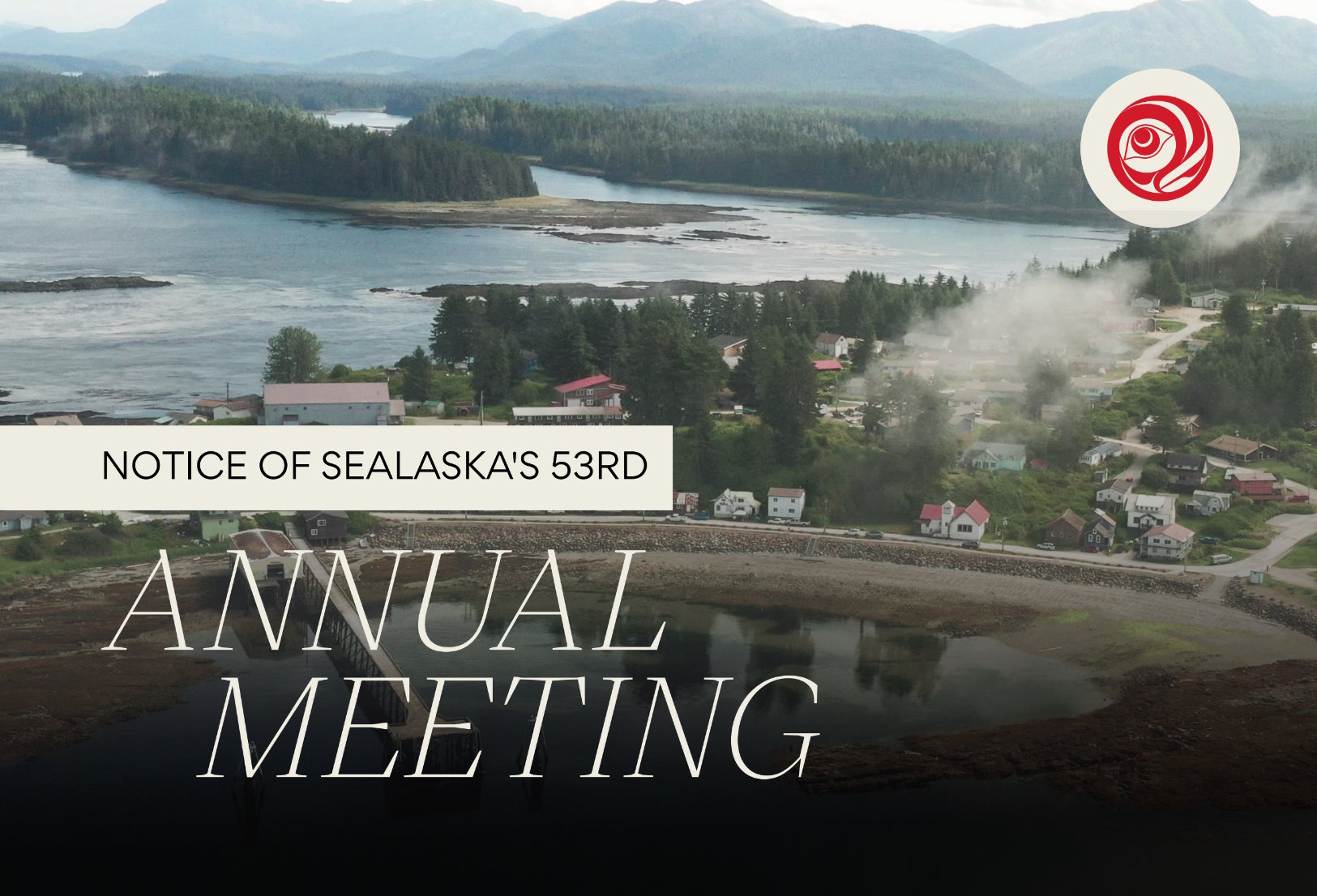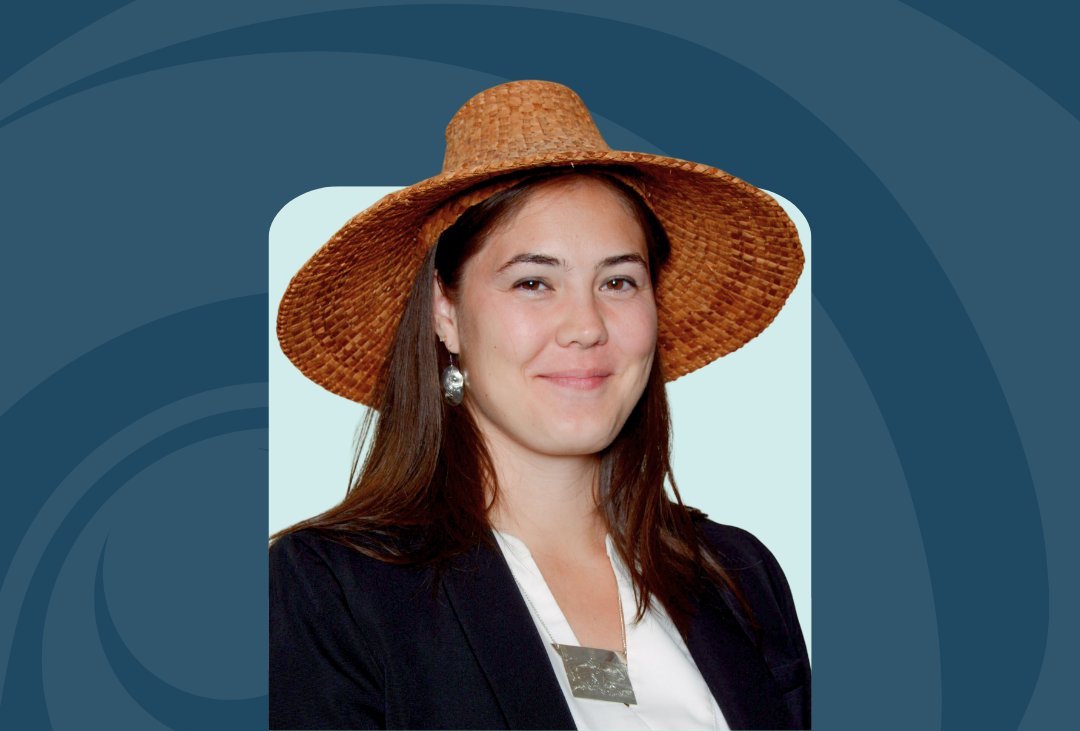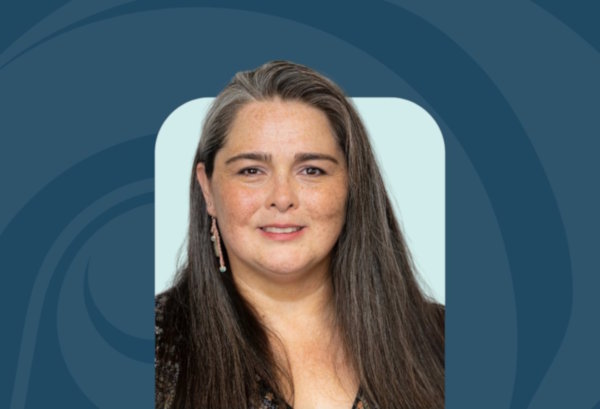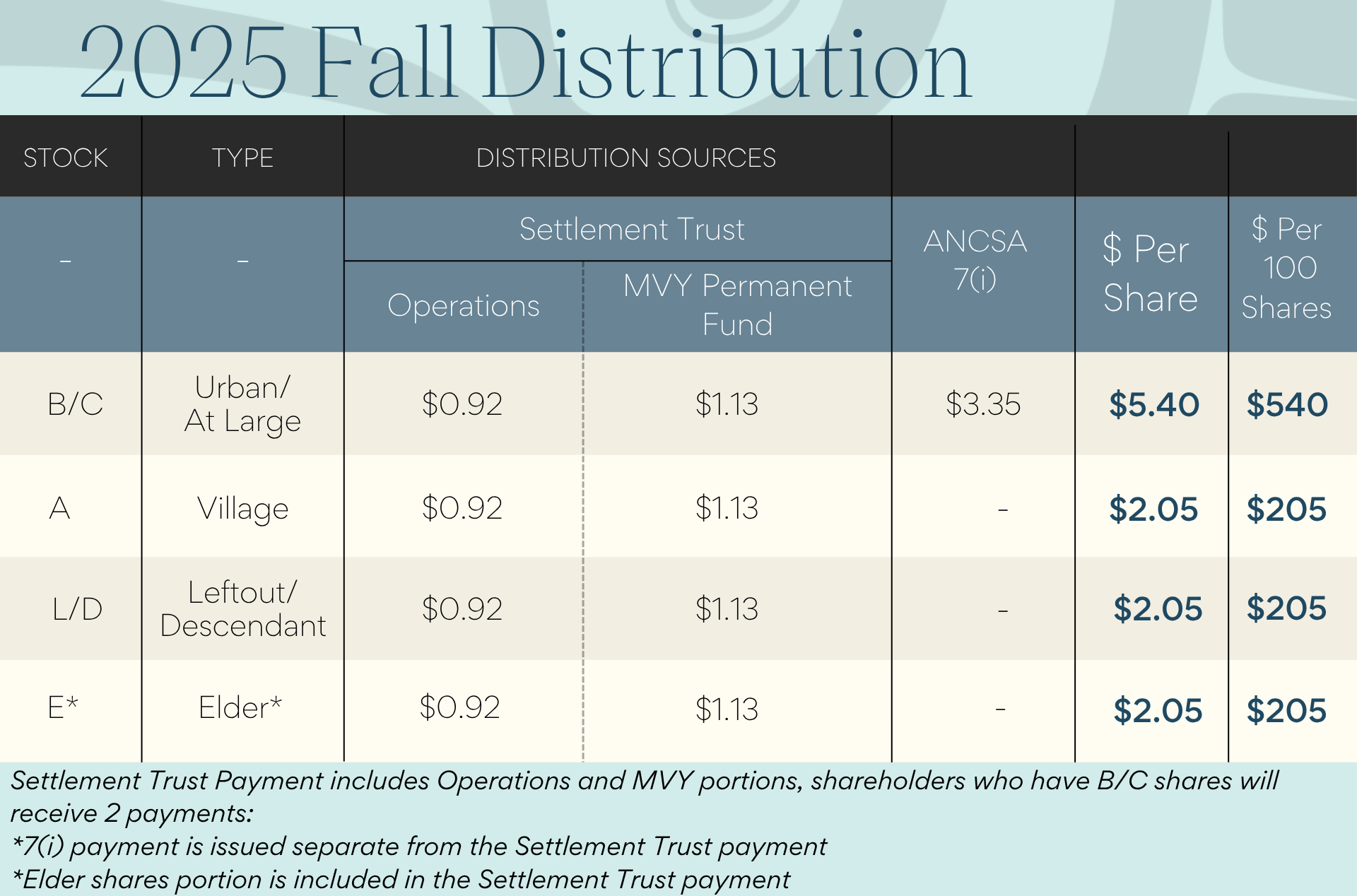April 14 Board Meeting Report to Shareholders
Wednesday, April 19, 2023
The Sealaska Board supports the LGBTQIA2S+ community, language grants and community donations through board action at the April board meeting.

The Sealaska Board of Directors approved several important resolutions at a board meeting on Friday, April 14. The meeting was held on Sheet’ka Kwaan (Sitka) in a gesture of support for the critical work being done by the Herring Protectors to defend their sovereignty and advocate for the protection of herring. Sealaska is a proud supporter of this powerful work to safeguard traditional ways of life, food security and relations between human and non-human relatives such as yaaw/k’áaw/shga (herring).
 “The work being done by the Herring Protectors, Sitka Tribe of Alaska (STA) and others to strengthen connection to our ways of life is of the deepest importance to Sealaska shareholders and our board and management teams,” said Sealaska Vice President of Policy & Legal Affairs Jaeleen Kookesh. “Sealaska has assisted with herring litigation initiated by STA and provided comments to regulatory bodies including the Alaska State Board of Fish and the Federal Subsistence Board regarding ongoing challenges with Southeast Alaska’s herring fishery. We’re honored to support their efforts to restore balance to our cultural and ecological ecosystem.”
“The work being done by the Herring Protectors, Sitka Tribe of Alaska (STA) and others to strengthen connection to our ways of life is of the deepest importance to Sealaska shareholders and our board and management teams,” said Sealaska Vice President of Policy & Legal Affairs Jaeleen Kookesh. “Sealaska has assisted with herring litigation initiated by STA and provided comments to regulatory bodies including the Alaska State Board of Fish and the Federal Subsistence Board regarding ongoing challenges with Southeast Alaska’s herring fishery. We’re honored to support their efforts to restore balance to our cultural and ecological ecosystem.”
Sealaska’s board of directors approved a $37.7 million distribution to shareholders during the meeting (read more about the spring 2023 distribution here). However, its important business did not end there.
The board took action to uphold the civil and human rights of all shareholders — and all people, regardless of sexuality or gender identity — in response to recent legislation in Alaska and around the country attacking the rights of lesbian, gay, bisexual, transexual, queer, intersex, asexual and two spirit (LGBTQIA2S+) people. The board unanimously adopted a resolution in support of the LGBTQIA2S community.
“An attack on the rights of anyone in our community is an attack on us all,” said Director ‘Wáahlaal Gíidaak Barbara Blake. “Every single one of us is precious and deserves the utmost love, support and care. Our LGBTQIA2S+ community is under attack and we must stand united in this battle. I’m so grateful Sealaska has decided to stand in support of our LGBTQIA2S+ community.”
In addition to demonstrating support for LGBTQIA2S+ relatives and neighbors, the Sealaska Board of Directors continued its support for the advanced language learning community, approving $650,000 in grant funding for language revitalization programs. The board pledged grants to seven language revitalization and language learning projects through the Sealaska language fund.
 Goldbelt Heritage Foundation’s Ḵúx̱de Yaa Nas.áx̱ Haa Yoo X̱ʼatángi (Our Language Is Echoing Back) project, which aims to support meaningful relationships with birth speakers, learning and social use opportunities and fluency gains for Lingít educators and high-level learners, and development and provision of audio/visual content and broadly applicable
Goldbelt Heritage Foundation’s Ḵúx̱de Yaa Nas.áx̱ Haa Yoo X̱ʼatángi (Our Language Is Echoing Back) project, which aims to support meaningful relationships with birth speakers, learning and social use opportunities and fluency gains for Lingít educators and high-level learners, and development and provision of audio/visual content and broadly applicable
learning resources. A key aspect of this project is to pair birth speakers with educators to meet requests to hear and use fluent language and have difficult questions answered by birth speakers, whose unique perspectives provide clarity on Tlingit worldview.
- Juneau School District’s Juneau Alaska Music Matters (JAMM) program is working with Yuxgitsiy George Holly to develop a sustainable and effective Lingít language learning model at the elementary school level by building into the position collaboration at every level: classroom, school district and community so that the advanced speaker in this position has time to
advance their own language skills, continue to learn from fluent speakers and elders, and work with UAS language scholars and elders to develop new Lingít contemporary words specific to music terminology. This program pairs the advanced speaker with young language learners who are also musicians to combine Lingít language learning with music lessons.
- Haa Tóo Yéi Yatee, whose goal is to increase language fluency by partnering with other organizations to host language events with fluent birth speakers and advance the language fluency of language teachers, beginning and intermediate language learners. In an effort to
bring language into everything that they do, Haa Tóo Yéi Yatee will host culture camps with language immersion and language activities based around conversational Lingít.
- Tlingit & Haida, whose program has four primary objectives: continue work with 2-3 mid- to advanced-level speakers from each of the three Southeast Alaska Indigenous languages
through the Tlingit & Haida CHE department; provide time and space for Language Scholars to meet in person in space that recharges, reenergizes and heals; produce documentary-style video shorts featuring the revitalization efforts of the three Southeast Alaska Indigenous languages; and organize and convene language ceremony (Galaada) with the X̱aad Kil language community.
- Ketchikan Indian Community (KIC) plans to continue hosting in-person and online language classes in X̱aad Kil, Sm’algya̠x and Lingít. They also are creating Indigenous language curriculum and supporting advanced speakers in increasing proficiency.
- Outer Coast College will host the second annual Tlingit Language Conference this summer, with a theme of Learners Teaching Learners for Sitka community members and Tlingit language teachers from across Alaska and the Yukon. Their goal for the 2023 conference is to increase participation from 50 to 100 participants.
- Yakutat Tlingit Tribe will focus their project on the creation of an adult learning cohort and weekly class, designed to support increased fluency in advanced speakers while establishing a support system for adult learners at all stages of fluency and building additional teaching capacity for their community’s learning nest for children.
 Roby Littlefield aims to support intermediate and advanced Lingít language speakers through their mentorship of teaching specialists with a goal of more effectively using the language throughout the education system and in the classroom. By collaborating with other speakers, intermediate and advanced Lingít language speakers and teaching specialists will all gain higher communication skills in the Lingít language.
Roby Littlefield aims to support intermediate and advanced Lingít language speakers through their mentorship of teaching specialists with a goal of more effectively using the language throughout the education system and in the classroom. By collaborating with other speakers, intermediate and advanced Lingít language speakers and teaching specialists will all gain higher communication skills in the Lingít language.
A project entitled Sm’algyax Files, which will help support the creation of a database to support Sm’algyax language accessibility and digital access, also received funding through a separate award.
The board of directors concluded the April board meeting by approving four donations to community and cultural projects:
- Kichxáan Héeni Canoe Project — Sealaska will participate in a funding partnership to help the Ketchikan Area Arts & Humanities Council bring the Kichxáan Héeni Canoe Project to life. This suspended outdoor public art piece will be situated along the Schoenbar Trail overlooking Kichxáan Héeni (Ketchikan Creek) in downtown Ketchikan in respectful acknowledgement of the traditional salmon harvesting grounds of the Sanyaa Kwáan and Taant’a Kwáan people.
- Kake Salvation Army Building — Sealaska will provide funding to assist the City of Kake in the construction of a new Salvation Army building. Constructing an updated, energy efficient building to house all the Salvation Army’s services under one roof will better meet community needs and support the Kake community.
- Hoonah Alaska Native Brotherhood (ANB) Community Center — Sealaska will assist in funding the renovation of Hoonah’s ANB Community Center, which was shuttered in 2013 due to safety concerns. Creating a safe, inviting space where the community can gather and host events is a priority that Sealaska’s board of directors is proud to support.
- Troth Yeddha’ — Sealaska will assist in funding the University of Alaska Fairbanks’ future Indigenous Studies center. Troth Yeddha’ will support Indigenous students from across the state as they pursue higher education, creating a uniquely Indigenous space — a home away from home — where Indigenous students can thrive authentically as they work toward higher education goals, communicating to students a message that Sealaska wholeheartedly endorses: “You belong here.”
“We are pleased to be able to make these community investments with partners who are doing powerful work every day,” said Sealaska Board Chair Joe Nelson. “As we continue working together, it is imperative that we underscore the ‘unity’ in ‘community’. We are stronger together.”
Please join us via Facebook Live or Zoom for a virtual Board Q&A session on April 25 from 12-1 p.m. Alaska time to learn more about the board’s recent work along with Sealaska priorities and initiatives.
Latest News
Notice of Sealaska's 53rd Annual Meeting of Shareholders
Pinned - Posted 2/12/2026The 2026 Sealaska Annual Meeting of Shareholders will be held on Saturday, June 27, in Angoon, Alaska. This year’s meeting will take place at the Angoon Elementary Gym, located at 500 Big Dog Salmon Road, Angoon, AK 99820.
Sealaska Welcomes Madeline Soboleff Levy
Posted 2/7/2026Sealaska welcomes Madeline Soboleff Levy as our new Vice President of Policy and Corporate Affairs.
Online Notary Service for Stock Wills
Posted 1/28/2026Sealaska is pleased to welcome Heather Shá xat k’ei Gurko
Posted 12/17/2025Sealaska is pleased to welcome Heather Shá xat k’ei Gurko as our new Director of Shareholder Communications.














